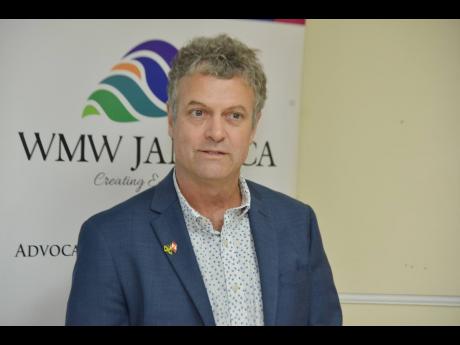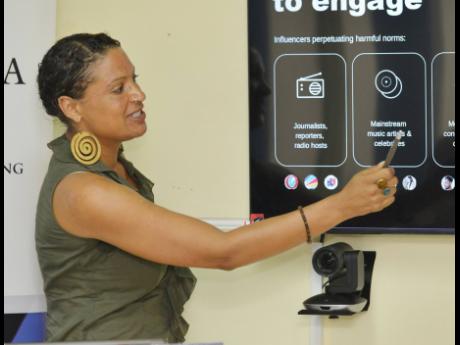Canada reaffirms commitment in fight against gender-based violence
A REPRESENTATIVE of the Canadian government has made clear that it remains dedicated to supporting Jamaica in its efforts to fight against gender-based violence (GBV).
Christian DaSilva, counsellor and head of cooperation of Jamaica and the Caribbean regional development programme at the High Commission of Cananda, made the statement at the WE-Talk artificial intelligence (AI) research report media launch and consultation at Canada’s field support services project office in Kingston on Tuesday.
The study, which utilised AI, was conducted to gain a deeper understanding of the gender-based norms and perceptions of Jamaicans as depicted through their online content creation and comments posted on various social media platforms.
Global Affairs Canada is providing funding for the five-year, CA$5 million (approximately J$570 million) WE-Talk initiative that has an emphasis on GBV and is committed to support women, teen moms, elderly women, women living in inner-city neighbourhoods, men, girls, and boys in Jamaica.
The project will address GBV across two pillars, behavioural change communication (BCC) to increasing community and individual awareness of pervasive harmful norms, practices, and myths that lead to the prevalence of GBV and increasing the engagement and ability of targeted community members including leaders and influencers, to become champions of change.
The second pillar is strengthening the capacity of civil society organisations (CSOs), women’s rights organisations (WROs), youth organisations and feminist collectives to coordinate and promote social norms change, strengthen the actions and commitments of duty bearers to address GBV and to provide quality services for survivors.
The research findings, according to DaSilva, will provide a “deeply nuanced view” of the discourse around gender inequality and GBV between women, men, boys, and girls in the virtual world and serve to develop WE-Talk’s targeted behaviour change messaging initiatives.
Spotting trends
Considering the age and gender cohorts who use social media, he went on to say that using AI in this way was “very valuable”.
He claimed that the team’s use of technology and methodology had made it possible to spot trends, as well as the norms and behaviours that went along with them.
This, he said, will allow for the development of intervention strategies that aim to “curb and hopefully mitigate the harmful effects of these behaviours, ultimately promoting digital respect and creating a safer virtual environment for all”.
In order to gain an understanding of the most widespread and comprehensive norms in Jamaica that harm survivors of GBV or perpetuate harmful myths surrounding gender identity, Fia Walklet, a senior research associate at Quilt.AI who joined the programme virtually, explained that one of the research methodologies used in the study was the analysis of over 15,000 data points from the various social media platforms used by Jamaicans. These include YouTube video comments, X (formerly Twitter), Meta (formerly Facebook), Instagram, TikTok and other online forums and public pages.
Through this, 11 norms were identified and categorised based on size and growth, as they could either be deemed as receding (small size and growth), emerging (small size, high growth), dominant (large size, high growth), or stable (large size, low growth).
The norms identified are:
• Genderless violence – the belief that there’s no such thing as GBV or there’s just more general violence in Jamaica that even affects men more;
• Trivialising risk factors – the belief that GBV risk factors are so ingrained in Jamaican society that they should be mocked rather than dismantled;
• Unfaithful and unfeeling – the belief that women, by nature, are immoral and villainous, evidenced in behaviours like cheating or paternity fraud;
• Invincible matriarch – the belief that women hold more power in Jamaican society – financially, professionally, and familiarly – and therefore aren’t victimised;
• Hypersexualisation – the belief that women are inherent sexual objects, dehumanising their experiences and needs;
• Mastering masculinity – the belief that, in order to become a man, you must be dominant, disrespectful, and controlling, both sexually and in society;
• The puritanism ideal – the belief that behaviours or identities that deviate from biblical purity or “goodness”, that is, premarital sex or homosexuality, is wrong;
• Unsafe sex – the belief that sexual intercourse for women is supposed to be rough, violent, and painful (informed by a lack of comprehensive sexual education);
• Education – the belief that sexual education is superfluous or controversial, preventing women from learning about reproductive or sexual safety;
• Transactional relationships – the belief that sexual acts are driven by the exchange of material value, which can include money, goods services, or protection;
• A child “disciplined” – the belief that physically harming children through corporal punishment is acceptable, promoting violence as a means of discipline.
Other partners in the We-Talk programme, which was officially launched in November 2022, include Oxfam Canada, Caribbean Male Action Network (CariMAN) Jamaica and the non-governmental organisation, Women’s Media Watch (WMW) Jamaica that specialises in using gender-aware media analysis and transformative action to cultivate gender-equity, justice and violence-free social relations.
International Day for the Elimination of Violence Against Women is marked on November 25. Additionally, it signifies the beginning of the UNiTE campaign, a 16-day activism undertaking that runs from November 25 to December 10 in observance of International Human Rights Day on December 10.


